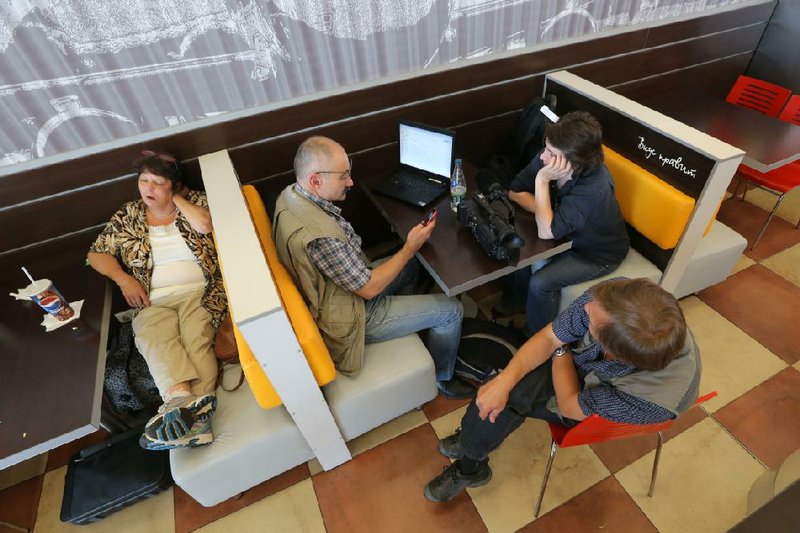MOSCOW - Moscow’s main airport swarmed with journalists from around the globe Wednesday, but the man they were looking for, National Security Agency leaker Edward Snowden, was nowhere to be seen.
The mystery of his whereabouts only deepened a day after President Vladimir Putin said Snowden was in the transit area of Sheremetyevo Airport.
Hordes of journalists camped in and around the Russian airport, looking for Snowden or anyone who may have seen or talked to him. Sheremetyevo’s press office declined to comment on Snowden’s whereabouts.
The anti-secrecy group WikiLeaks, which has been aiding Snowden, said Wednesday that he was “well” in a post on Twitter.
WikiLeaks said one of its staff members, Sarah Harrison, is traveling with Snowden, but the statement gave no indication if the update came from her, from Snowden or another source. WikiLeaks spokesman Kristinn Hrafnsson did not immediately return a call and a text seeking further comment.
Snowden, who is charged with violating American espionage laws and has had his U.S. passport revoked, fled Hong Kong over the weekend and flew to Russia. He booked a seat on a Havana-bound flight Monday en route to Venezuela, but didn’t board the plane. His ultimate destination was believed to be Ecuador.
Adding to the uncertainty, Ecuador’s foreign minister said it could take months to decide whether to grant asylum to Snowden and that the country would take into consideration its relations with the U.S.
Foreign Minister Ricardo Patino compared Snowden’s case to that of Julian Assange, the founder of WikiLeaks, who has been given asylum in the Ecuadorean Embassy in London.
“It took us two months to make a decision in the case of Assange, so do not expect us to make a decision sooner this time,” Patino said during a visit to Kuala Lumpur, Malaysia.
Patino said Tuesday that his government has spoken with the U.S. regarding Snowden’s asylum request and is still waiting for an official statement outlining the U.S. position.
Speaking Wednesday in Kuala Lumpur, he declined to say if his country will protect Snowden if he seeks refuge at an Ecuadorean Embassy.
Ecuador’s President Rafael Correa shot back at critics Wednesday, taking special aim at an editorial in The Washington Post that described him as “the autocratic leader of tiny, impoverished Ecuador” and accused him of a double standard for considering asylum for Snowden while stifling critics at home.
“The shamelessness of the century: Washington Post accuses Ecuador of double standard,” Correa said on his Twitter page.
As a contractor for the National Security Agency, Snowden gained access to documents that he gave to the Post and British newspaper The Guardian to expose what he contends are privacy violations by an authoritarian government.
Correa on Wednesday complained that the international media have “managed to focus attention on Snowden and on those ‘wicked’ countries that ‘aid’ him, making us forget the terrible things against the U.S. people and the whole world that he denounced.”
Meanwhile, Hong Kong officials said Wednesday that they allowed Snowden to leave for Moscow because the U.S. government got his middle name wrong in documents it submitted seeking his arrest.
Hong Kong immigration records listed Snowden’s middle name as Joseph, but the U.S. government used the name James in some documents and referred to him only as Edward J. Snowden in others, Justice Secretary Rimsky Yuen said. The U.S. also did not provide his passport number and did not respond to requests for clarification, Yuen said.
Elsewhere on Wednesday, the European Union Justice Commissioner Viviane Reding said she wrote a letter to U.K. Foreign Secretary William Hague asking “for a very urgent reply by the end of this week” on the nature and extent of a purported online eavesdropping operation comparable to the U.S. international Internet surveillance effort.
Last week, The Guardian cited British intelligence memorandums leaked by Snowden to claim U.K. spies were tapping into the world’s network of fiber optic cables to deliver the “biggest Internet access” of any member of the Five Eyes - the name given to the espionage alliance of the United States, Britain, Canada, Australia and New Zealand.
In Germany, lawmakers demanded a Europe-wide debate on Internet privacy after reports about the program.
Reding had already sought answers from the United States over the surveillance carried out by the National Security Agency. She said she was still waiting for clear answers.
Information for this article was contributed by Maria Danilova, Sean Yoong, Lynn Berry, Raphael Satter, Frank Jordans and Raf Casert of The Associated Press; and by Anton Doroshev, Nicole Gaouette, Ranjeetha Pakiam, Olga Tanas, Henry Meyer, David Lerman, Jonathan Tirone, Nathan Crooks, Corina Pons and Nathan Gill of Bloomberg News.
Front Section, Pages 5 on 06/27/2013


